In This Section:
Bachelor of Kinesiology (BKin) Program Overview
The Faculty of Kinesiology and Physical Education offers an undergraduate program that is designed to equip graduates with the knowledge and skills necessary to pursue careers or further study, especially relating to physical activity and health.
The BKin program offers several unique features:
Interdisciplinary Curriculum
Students complete 20 full course equivalents from a range of subjects deigned to provide a broad, interdisciplinary education, while allowing for depth of study in areas of interest. To prepare students for a broad range of careers or further study after graduation, required courses across the full spectrum of kinesiology and physical education, including areas such as anatomy and physiology, sport and exercise psychology, motor control, biomechanics and physical cultural studies are offered. In the upper years of the program, optional courses provide an opportunity for continued breadth or expanding depth of study in one or more areas. In addition, up to three certificates, aligning with the United Nations Sustainability Development Goals and each identifying an area of focus in either Global Kinesiology & Physical Education, Physical Activity Instruction, Clinical Movement Sciences, Foundational Sciences and Research, Mental Health and Physical Activity, Social and Environmental Justice, or Sport Sciences can be pursued. The curriculum also includes one and a half to six elective full course equivalents from the course offerings within other divisions within the University, thereby allowing students to pursue a minor in an area of interest.
Applied Learning
To bring learning to life and strengthen the relevance of the curriculum, the program includes several opportunities to engage in applied learning. Across a number of courses, students are provided opportunities to integrate their theoretical knowledge with applied experiences in health, sport, exercise and physical activity settings. In the upper years, students may choose to be paired with a mentor in the field to develop professionally related competencies, while obtaining credits towards their BKin degree.
Research Opportunities
As a result of University of Toronto’s strong, international reputation as a research-intensive university, all students will have the benefit of learning from professors who are actively engaged in research and therefore can bring the most up to date research into the classroom. In addition to the inclusion of research assignments in courses, four upper year elective courses provide students with the opportunity to work individually with a professor on a research project.
Combined Degree Bachelor of Kinesiology/Master of Teaching (BKin/MT) Opportunity
Students who wish to pursue a formal teaching degree may apply to the graduate program (Master of Teaching) at the University of Toronto’s Ontario Institute for Studies in Education (OISE) in their third year of the BKin. If successful, they will combine their final year in the BKin program with their first year of study in the MT program at OISE by taking two courses that will count towards both degrees. After they graduate from the BKin program in the spring and ensure they have maintained eligibility requirements, they will continue their studies as full-time MT graduate students in the fall.
Equity and Inclusion
The Faculty has a strong reputation in advancing equity and inclusion through its courses, support services and student-run activities. Across the four years of the curriculum, students will learn about de/colonization, ethics, power and their intersections and engage in inclusive, anti-oppressive practices related to the field of kinesiology and physical education. Graduates will be well positioned to advocate for and engage in equitable and inclusive practices in their future academic and/or professional pursuits.
Student Supports
Students have access to a group of welcoming and highly trained staff members in the Office of the Registrar and Student Services Office. The Office is an excellent resource that provides and connects students to supports including academic advisors, learning strategists, career educators, accessibility advisors, and embedded wellness counsellors.
